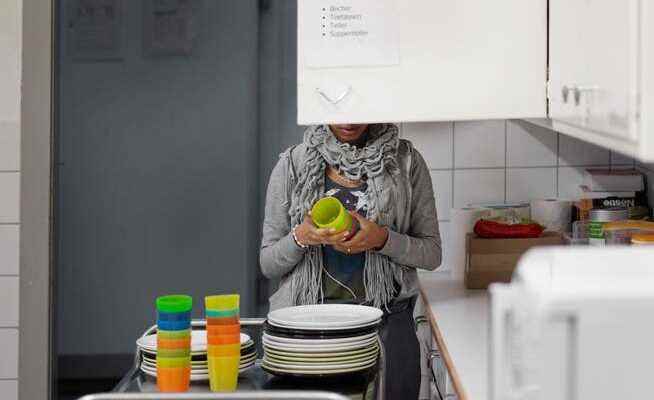Against the will of the city council, the city of Zurich’s parliament passed a postulate calling for an investigation into the Lilienberg asylum center. The AOZ annual report was also rejected.
A picture from 2014. At that time, girls also lived in the Lilienberg center. Today it is only male adolescents.
The conditions in the Lilienberg asylum center in Affoltern have been making headlines in some media for weeks. Former employees report that around ninety so-called MNA – mineurs non accompagnés, i.e. unaccompanied underage asylum seekers – live in the home, which was designed for significantly fewer people. Violent conflicts are also common.
City council rejects postulate
The topic has now arrived in politics: the cantonal council dealt with it on Monday, and the cantonal social welfare office, which is responsible for the home, will carry out an extraordinary audit. On Wednesday it was the town council’s turn. On the one hand he had to deal with the annual report of the asylum organization Zurich (AOZ), on the other hand a postulate submitted by the SP, Greens and AL was on the agenda, which required a report on the accommodation of MNA since 2014. The AOZ is an independent public law institution of the city of Zurich.
The city council rejected the request for a further report, mainly because in this specific case the canton is a contractual partner of the AOZ. Social director Raphael Golta said that the city did not have everything under its control. You can’t simply fall back on a cantonal agency for a report. So disappointments are foreseeable.
Please let the criticism flow to the responsible supervisory bodies, for example the cantonal social welfare office, which is now doing an audit. And if the municipal council wants to investigate the matter, you have to turn on your own business audit committee.
The majority of the municipal council was not swayed by Golta’s vote. Normally it is the SVP alone that opposes the acceptance of the AOZ annual report. This time he was also rejected by the red-green side and the GLP.
The FDP opposed this kind of symbolic politics most violently. The FDP also clearly opposed the postulate: there are already numerous reports, no new ones are needed, said Alexander Brunner, for example. The allegations would also concern the FDP, said Michael Schmid. But one would now act better and improve the conditions. The council, despite these objections, clearly referred the postulate to the city council.
The role of the canton was discussed several times in the debate, but unfortunately it was always somewhat moot. There was talk of the “difficult framework conditions”, the “sensitive environment”, the “rigid specifications of the cantonal social welfare office”. Luca Maggi (Greens) was the clearest. He said that the 2019 contract between the AOZ and the canton was unsuitable: “You just can’t keep what you promised for the price at the time.”
AOZ: “It’s our turn”
There was also strong criticism of the cantonal security director. He publicly claimed that the canton wanted to open an additional facility for MNA, but the AOZ was not willing to do so. This statement is simply wrong, said Walter Angst (AL) and Luca Maggi (Greens). In the meantime, a branch of the Lilienberg center has been opened, which brings great relief, said City Councilor Raphael Golta. “We’re on the right track, but it will take a moment.”
The AOZ said something similar on request. One does not want to comment in detail at the moment, because the cantonal investigation is imminent. Martin Roth, head of the AOZ communications manager, nevertheless emphasized that the MNA area had not remained idle in the last two years. Measures have already been taken to improve the situation, and talks are being held with the cantonal social welfare office as the client and the city of Zurich. “There needs to be movement in this area, but it’s our turn,” said Roth.
